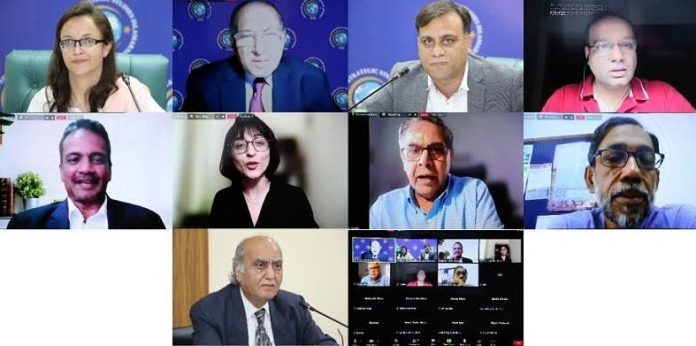ISLAMABAD, JUL 5 /DNA/ – The Centre for Strategic Perspectives (CSP), and India Study Centre (ISC) at the Institute of Strategic Studies Islamabad (ISSI) organised a Webinar titled, “Non-Traditional Security Challenges in South Asia” on July 05, 2022. The discussants included: Mr Sanjay Vashist, Director, Climate Action Network South Asia; Professor Buddhi Marambe, University of Peradeniya Sri Lanka; Ms Puruesh Chaudhry, Founder & President AGAHI; Mr. Ali Tauqeer Sheikh, Advisor on Climate Change, Planning Commission of Pakistan;and Professor Muhammad Rezaur Rahman, Bangladesh University of Engineering and Technology. The Session was moderated Dr Arshad Ali, Director of ISC.
In her introductory remarks Dr Neelum Nigar, Director, CSP, welcomed the guests and said that post-Cold War Non-Traditional Security Challenges (NTSC) have become an important issue. South Asia is faced with issues related to climate change and is adversely affected by them, and there is a need to optimally address them.
During his welcome remarks ambassador Aizaz Ahmad Chaudhry, Director General, ISSI, said that NTSC are very broad-based, and South Asia is one of the vulnerable regions with regards to climate change. Global factors are also exacerbating these issues and there is a need to have extensive discussion regionally to resolve them.
While speaking on the issue of climate change and environmental degradation, Mr Sanjay Vashiststated that climate change is forcing people to migrate and it is important to provide legal protection to all such people. Moreover, to mitigate climate change, it is important that more resources are allocated for protecting the people and development of the region.
In his remarks about the issue of food security in the region, Professor Buddhi Marambesaid that food security is a national security issue and needs to be tackled accordingly. The issue is being aggravated due to the decline in crop yields in South Asia. Decisions taken by people impact climate change and food security and thus needs to have scientific-based solutions to tackle them.
Ms Puruesh Chaudhryhighlighted the effects of population explosion for the region and stated that demographics are changing in South Asia due to increasing population and impacting both urban and rural centres. The population increase should be seen as a scenario-based exercise. There is a need to create a long view approach so that the policymakers have a potential idea about what are the problem areas and how they should be dealt with.
While highlighting the nexus of water security and climate change, Mr. Ali Tauqeer Sheikhsaid that in South Asia rivers have been divided whereas other countries have divided waters. There is a need to bring elements of climate change mitigation into the Indus Water Treaty as has been done in the Ganges Treaty. South Asia needs to protect water ecosystems and have flexible water management solutions to deal with issues of water security being caused by climate change.
In his talk about disaster risk management in South Asia, Professor Muhammad Rezaur Rahmanstated that South Asia is faced with many natural disasters and the increase in calamities has become a new normal. New kinds of disasters like heatwaves, lightning strikes, and pandemic are also increasing in the region. The emergence of these new hazards is further aggravated by infrastructural traps. Thus, there is a need to exchange data, improve resilience and engage civic bodies for effective results of DRM in the South Asian region.
Ambassador Khalid Mahmood Chairman BoG, ISSI concluded the Webinar by saying that the focus in the past in South Asia has been on hard security but now NTSC needs to take precedent as it is becoming a pressing issue and can lead to conflict in the region. Therefore, there is a need for a coordinated approach at national, regional, and international levels to deal with the menace of climate change, food and water security issues in the region.

















